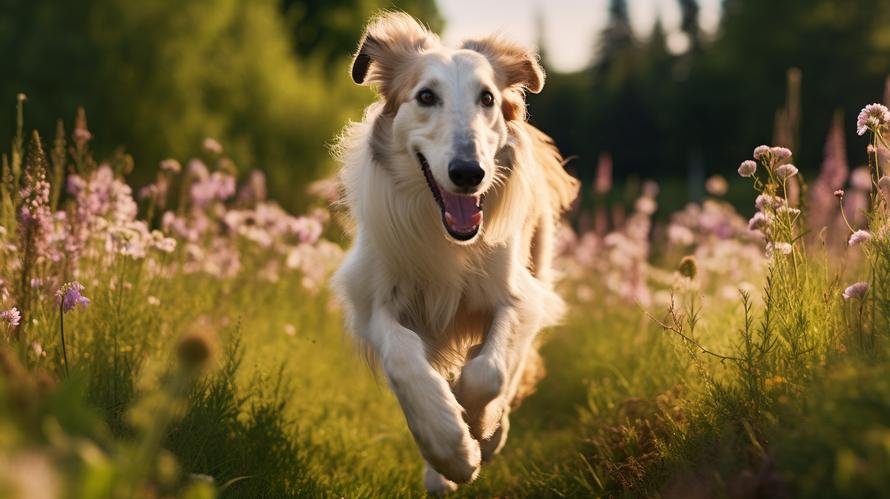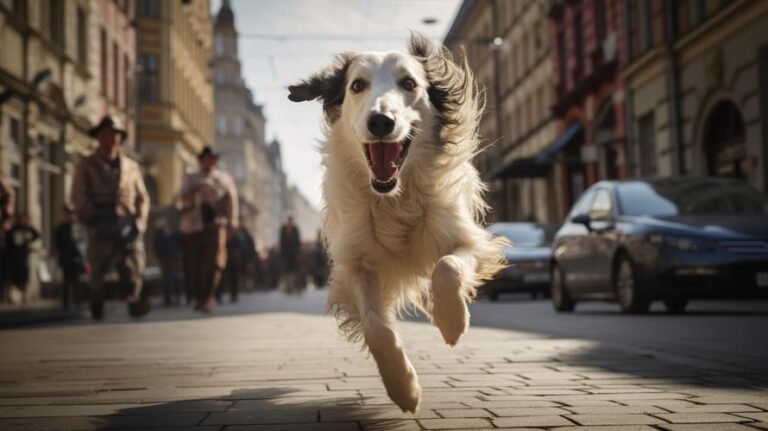Picture this, you’re at your local park and you see an elegant, tall figure racing at lightning speed across the horizon. No, it’s not a deer, you squint and realize, it’s a dog. A canine that appears straight out of a fairy tale, with its elongated limbs, dramatic, flowing fur, and a face that somewhat resembles a cross between a wolf and a fox. You’ve just encountered a Borzoi, a breed that radiates an ethereal beauty, so much so that it was once a canine of choice among Russian aristocracy. Made you curious? Let’s dive deeper into getting to know this uniquely charming dog breed and respond to a question that’s been boggling the minds of many prospective pet owners – Is Borzoi a difficult dog?
Often described as an aristocrat of dogs, the Borzoi, also known as the Russian Wolfhound, originates from the Arctic regions of Russia. These athletic hounds were bred for high-speed pursuits of prey across vast distances. The word Borzoi means ‘swift’ in Russian, making it a fitting name for these agile hunters. Over the centuries, their utilitarian purpose has transformed into a companion who provides elusive, wolfish charm to our homes.
The first thing to debunk about the Borzoi is a common misconception that their dignified appearance correlates to a challenging disposition. Sure, they are stunning, but does that mean they’re difficult to handle? The answer, perhaps surprisingly to some, is a definitive no. Borzois are generally gentle, intelligent, and possess an independent spirit, which some dog owners may misconstrue as stubbornness or aloofness. With the right approach to training and socialization, however, these dogs have the potential to shine in their unique, enchanting way.
Let’s get one thing straight: Borzois aren’t your average playful, goofy dogs. They’re reserved, even cat-like, in their behavior and prefer serene environments. If you want a dog who loves cuddling on the couch with a calm measure of space in between, you’ve found your match in a Borzoi. They are less likely to engage in raucous games of fetch or tug-of-war, but aren’t averse to occasional playtimes either.
The Borzoi’s independent nature is often mistaken as a sign of difficulty. This misconception likely arises from owners expecting this breed to be similar to more eager-to-please breeds such as the Labradors or Golden Retrievers. However, once you understand that a Borzoi values independence over obedience, you’ll find them far from difficult. They need a patient and understanding pet owner who respects their personal space and individuality. If you try to dominate or control them, they may respond with aloofness. If you let them be, understanding their independent nature, you will see how affable and tolerant they can be.
When it comes to training your Borzoi, you must remember that this breed was designed for hundreds of years to think and make decisions on their own while hunting. This trait still shines through in their personalities. Consistency, patience, and positive reinforcement will go a very long way. Resorting to harsh training methods or trying to force a Borzoi into submission will result in a dog that’s unhappy and distant.
These dogs generally get along well with other dogs and can coexist peacefully with cats, too, if they’ve been raised together. However, their high prey drive means that they can’t always be trusted around smaller animals. So, while they might not be the best pick for households with rabbits, guinea pigs, or birds, if your home is filled with dogs or cats, a Borzoi might slide seamlessly into your family.
One of the main concerns a prospective Borzoi owner might have is space. After all, these dogs are sizable and have a heritage of pursuing prey across vast landscapes. You might assume Borzois need a lot of space to roam. While sufficient exercise is important to this breed, they are known to be quite adaptable and can comfortably live in apartments, given they’re provided with regular opportunities to stretch those long legs during walks or short, high-speed chases within a secure, fenced area.
While these dogs do need regular exercise to stay fit and healthy, they’re certainly not as high-energy as some other breeds. A well-exercised Borzoi is usually a calm, quiet companion inside the house. Despite being large dogs, they’re also relatively light and gentle, minimizing the risk of them unintentionally knocking things over or causing damage.
Another factor that could label a Borzoi as “difficult” could be their grooming needs. Yes, the Borzoi has a luscious, long coat that looks like it needs high maintenance, but it’s not as demanding as you might think. Regular brushing a few times a week will keep it in top condition, and they’re not excessively prone to shedding. While they aren’t hypoallergenic, their impact on allergy-sufferers tends to be quite mild compared to some other breeds.
In short, the Borzoi is an enchanting breed that blends grace and independence with a gentle, loving temperament. They require a conscientious owner who appreciates their unique traits. While some might argue they are difficult due to their dignified demeanor and independent spirit, others will argue they are compelling, capturing the essence of real companionship. Ultimately, the Borzoi proves that difficulty is subjective to one’s expectation – expecting a retriever-like obedience and playfulness from a Borzoi would indeed prove difficult. On the other hand, understanding and appreciating their individuality raises a serene and gentle companion.



